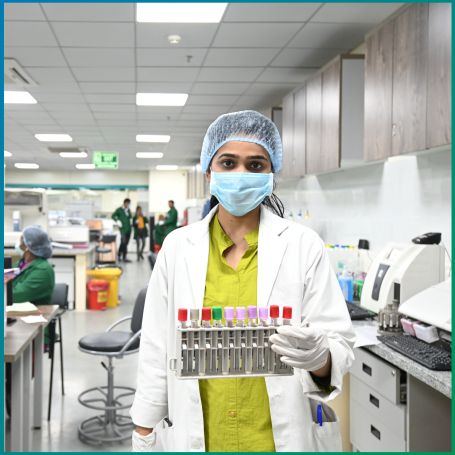
Karyotyping involves staining chromosomes and arranging them in a standardized format to visualize their size, shape, and number.


Karyotyping is a crucial laboratory technique used to examine an individual's chromosomes. It provides essential information about chromosomal abnormalities that can lead to genetic disorders, developmental issues, and reproductive problems. The "Karyotyping-Products of Conception" test specifically focuses on analyzing chromosomal patterns in products of conception (POC), such as tissue obtained from miscarriages or ectopic pregnancies.
The primary purpose of the karyotyping-products of conception test is to analyze chromosomal abnormalities in tissue samples obtained from miscarriages or ectopic pregnancies. The specific objectives include:
1] Diagnosis of Genetic Causes: To identify any chromosomal abnormalities that may have contributed to pregnancy loss.
2] Counseling and Guidance: To provide genetic counseling to parents, helping them understand the implications of the findings for future pregnancies.
3] Understanding Reproductive Health: To gain insights into patterns of chromosomal abnormalities that could inform clinical practice and improve patient outcomes.
A] Sample Collection
The first step in the karyotyping-products of conception test involves the collection of tissue samples. These samples can be obtained from:
1] Miscarriage Tissue: Products of conception collected following spontaneous abortion.
2] Ectopic Pregnancy: Tissues collected during surgical intervention for ectopic pregnancies.
3] D&C Procedures: Tissue collected during dilation and curettage (D&C) procedures.
B] Laboratory Processing
Once the tissue sample is collected, it undergoes several processing steps:
1] Tissue Preparation: The collected tissue is processed to obtain a single-cell suspension. This involves enzymatic digestion to break down the tissue into individual cells.
2] Cell Culture: The isolated cells are cultured in a suitable medium to allow for cell division. This step is crucial as it increases the number of cells available for analysis.
3] Harvesting Cells: After sufficient cell growth, cells are harvested, usually during the metaphase stage of cell division when chromosomes are most visible.
4] Staining and Karyotyping: The harvested cells are stained using specific dyes that highlight chromosomes. The chromosomes are then visualized under a microscope, photographed, and arranged in pairs for analysis.
C] Analysis
1] Counting Chromosomes: The technician counts the number of chromosomes present in the sample, noting any deviations from the normal count of 46 chromosomes (23 pairs).
2] Identifying Abnormalities: Structural abnormalities, such as deletions, duplications, and translocations, are identified and documented.
3] Reporting Results: A detailed report is generated, summarizing the karyotyping results, including any chromosomal abnormalities detected.
At Diagnopein, we offer comprehensive, accurate, and timely diagnostic services, including the Products of Conception for Karyotyping Test. With our NABL-accredited labs, cutting-edge technology, and skilled technicians, you can be assured of reliable results every time. Get your results quickly, especially when time is crucial in detecting severe infections.
Competitive pricing without compromising on quality. Our team of experienced professionals ensures the test is conducted smoothly with minimal discomfort. We provide not just the Products of Conception for Karyotyping Test results but insights into your health condition, helping you and your doctor make informed decisions about treatment. For more information call us at +91 9204 108108.
The test helps diagnose genetic factors contributing to miscarriages, provides insights for future pregnancies, and aids in genetic counseling.
Samples can include tissue from miscarriage (products of conception), ectopic pregnancies, or tissue collected during dilation and curettage (D&C) procedures.
Tissue is usually collected during a medical procedure following a miscarriage or ectopic pregnancy, often performed by a healthcare professional.
Identifying chromosomal abnormalities can inform couples about risks in future pregnancies and guide them in making informed decisions.